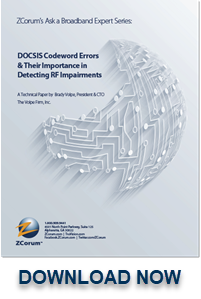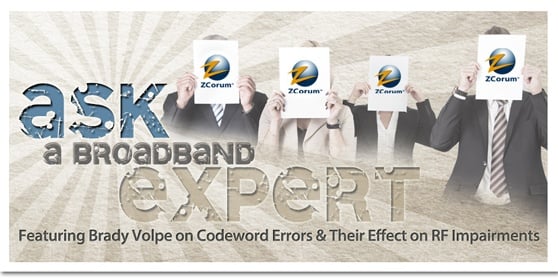Ask a Broadband Expert - What are DOCSIS Codeword Errors?
This month’s Ask a Broadband Expert features Brady Volpe, a highly respected speaker and industry thought leader on broadband. Mr. Volpe is a frequent presenter at industry trade shows, conferences and regional seminars. He has published numerous articles in worldwide trade journals and authored several white papers on DOCSIS protocol and VoIP test and analysis. You can find him on Twitter at @bradyvolpe and on LinkedIn here.
Brady recently wrote a white paper for broadband providers titled, "DOCSIS Codeword Errors and Their Effect on RF Impairments". In this first Ask a Broadband Expert blog, Brady answers three frequently asked questions about codeword errors with excerpts from the white paper. And, once you realize the importance of tracking uncorrectable and correctable codeword errors, check out our TruVizion diagnostics application for a great way to do that.
Question: Are codeword errors really that important?
Brady Volpe: You may not be familiar with DOCSIS codeword errors, but it is important to know that monitoring codeword errors will enable you to improve your subscriber’s quality of experience (QoE). How is this possible? DOCSIS codeword errors are the most effective metric  to determine if a data issue, like slow web pages, slow gaming, poor voice quality, etc., is an RF plant problem or if it is a data network problem. If you work in the field you know how critical this information can be. DOCSIS codeword errors are the deciding factor if you have an RF impairment or if you do not have an RF impairment. Period. If a high number of codewords go uncorrected then the subscriber may see their Internet slowdown. If the subscriber is using voice-over-Internet Protocol (VoIP) offered by the cable operator, Skype, Vonage, etc. voice and video calls will be especially impacted.
to determine if a data issue, like slow web pages, slow gaming, poor voice quality, etc., is an RF plant problem or if it is a data network problem. If you work in the field you know how critical this information can be. DOCSIS codeword errors are the deciding factor if you have an RF impairment or if you do not have an RF impairment. Period. If a high number of codewords go uncorrected then the subscriber may see their Internet slowdown. If the subscriber is using voice-over-Internet Protocol (VoIP) offered by the cable operator, Skype, Vonage, etc. voice and video calls will be especially impacted.
Question: What is a codeword?
Brady: Data transmitted between the CMTS and the modem is split into codewords that are usually 16 to 256 bytes in length. Each codeword contains extra data, called Forward Error Correction (FEC) that allows the original codeword to be rebuilt if the data is in error. When a subscriber is using a device, such as a PC or iPad, and transmits data over a DOCSIS cable modem, the FEC kicks in. There are two functions to the FEC protocol, the encoder and the decoder. The cable modem and CMTS act as both interchangeably, depending on data direction.
Question: What are codeword errors?
Brady: Codeword errors are corrupted bits of data in the transmission or flow.
There are two types of codeword errors: correctable and uncorrectable.
Correctable codeword errors refer to damaged codewords that can be repaired using the FEC data explained above. If the decoder finds that any bits in the codeword were corrupted it will use the extra correction data to attempt to fix the corrupted bits. If the bits can be repaired, then the decoder reports back with a correctable codeword, because the codeword was saved thanks to the forward error correction. This means the subscriber never knew that any RF impairment occurred. However, even with repairs, if a high number of correctable errors exist, this will also impede performance because the modem and CMTS are working to correct the data.
Uncorrectable codeword errors are those codewords that are damaged beyond the FEC’s ability to repair it. Uncorrectable errors require that the data be repeated and are usually the biggest concern. If the bits are not repairable the decoder reports an uncorrectable codeword. This means the subscriber’s device (PC, iPad, etc.) must re-transmit the data if possible and their QoE will start to diminish as uncorrectable codewords increase. This is especially true for real-time services such as gaming.
Want to know more about DOCSIS codeword errors? Download a free white paper from Brady?
About the Author: Marsha Hemmerich
Never miss a post.
Enter your email to subscribe:
- Ask an Expert (12)
- Blog (12)
- Technology (11)
- Hot Topics (8)
- ask a broadband expert (8)
- DOCSIS (7)
- PNM (7)
- proactive network maintenance (7)
- Industry Perspectives (5)
- BEAD (4)
- Broadband Funding (4)
- Customer Service (4)
- FCC (4)
- IIJA (4)
- PreEqualization Analyzer (4)
- correlation groups (4)
- fiber broadband (4)
- fiber optics (4)
- fiber troubleshooting (4)
- interview (4)
- CGNAT (3)
- Carrier Grade NAT (3)
- DDoS Attacks (3)
- DOCSIS pre-equalization (3)
- Diagnostics (3)
- Distributed Denial of Service Attacks (3)
- GPoN (3)
- IPv4 Conservation (3)
- Purchase IPv4 Addresses (3)
- What is DOCSIS PNM (3)
- broadband infrastructure funding (3)
- fiber (3)
- 5G (2)
- CALEA (2)
- CALEA Compliance (2)
- Codeword Errors (2)
- DOCSIS 3.1 (2)
- Distributed Access Architecture (2)
- Group Delay (2)
- ICFR (2)
- IP traffic (2)
- IPv6 migration (2)
- In Channel Frequency Response (2)
- Main Tap Compression (2)
- Marketing (2)
- Micro Reflections (2)
- Millimeter Wave (2)
- OTT (2)
- Rural Broadband (2)
- Types of DDoS Attacks (2)
- Voice Service (2)
- XGS-PON (2)
- broadband data collection (2)
- customer service (2)
- internet issues (2)
- mid-band spectrum (2)
- mmWave (2)
- network traffic (2)
- network virtualization (2)
- state broadband (2)
- state broadband program (2)
- weather-related Internet issues (2)
- 10G (1)
- BDC (1)
- BDC Availability Data Specification (1)
- BDC User Guide (1)
- BEAD Funding (1)
- Broadband Providers (1)
- Broadband Serviceable Location Fabric (1)
- Broadband Serviceable Locations (1)
- C-Band (1)
- CA Certificate Expiration (1)
- CAF II Requirements (1)
- CAF II Testing (1)
- CALEA SSI Plan (1)
- CBRS (1)
- Carpet Bombing (1)
- Citizens Broadband Radio (1)
- Communications Assistance for Law Enforcement Act (1)
- Connect America Fund (1)
- DAA (1)
- DOCSIS 4.0 (1)
- DOCSIS CA Certificate Expiration (1)
- DPoE (1)
- DPoG (1)
- EPoN (1)
- Excel Text Matching (1)
- Extended Spectrum DOCSIS (1)
- Extending HFC Life (1)
- FCC Broadband Map (1)
- FCC data (1)
- FTTH (1)
- FTTx (1)
- Fidelity Communications (1)
- Full Duplex (1)
- Greenfield Broadband (1)
- Hosted VoIP (1)
- IPTV (1)
- IPv4 (1)
- IPv6 (1)
- IPv6 Transition Plan (1)
- LTE (1)
- Low Latency DOCSIS (1)
- MAC/PHY (1)
- Mobile (1)
- Monitoring (1)
- Motivation for DDoS Attacks (1)
- Multi-Vector DDoS Attacks (1)
- NG-PON2 (1)
- NIST (1)
- NIST Cybersecurity Framework (1)
- NIST requirements (1)
- NetFlow (1)
- Network Traffic Management, (1)
- OTT video streaming (1)
- Private Access License (PAL) (1)
- RDOF Auction (1)
- RDOF Voice Requirements (1)
- Remote MAC/PHY (1)
- Remote PHY (1)
- Robocalls (1)
- Rural Broadband Network Advancement Act (1)
- Rural Digital Opportunity Fund (1)
- SSI (1)
- STIR/SHAKEN (1)
- Small Cells (1)
- Streaming (1)
- System Security and Integrity Plan (1)
- TV Viewership Analytics (1)
- TWDM-PON (1)
- TruVizion (1)
- Underserved Locations (1)
- Unserved Locations (1)
- Upstream Analyzer (1)
- Videos (1)
- VoIP (1)
- VoIP revenue (1)
- Wired Broadband (1)
- broadband data collection program (1)
- broadband deployment (1)
- broadband support (1)
- cableLabs (1)
- caf ii (1)
- case study (1)
- cloud-based VoIP (1)
- commercial VoIP (1)
- commercial VoIP revenue (1)
- cpe spectrum capture (1)
- customer service tip (1)
- cyber attacks (1)
- cybersecurity (1)
- dhcp (1)
- downstream spectrum issues (1)
- dual stack implementation (1)
- dynamic spectrum sharing (1)
- electric membership cooperatives (1)
- fiber Internet (1)
- fiber deployment (1)
- forward path monitoring (1)
- free download (1)
- full band capture (1)
- holiday customer service (1)
- holiday tech support (1)
- ingress (1)
- middle mile grant program (1)
- net neutrality (1)
- open access fiber (1)
- open access fiber network (1)
- open access networks (1)
- pppoa (1)
- pppoe (1)
- pre-equalization (1)
- reduced maintenance costs (1)
- remote spectrum analyzer (1)
- return path (1)
- scott helms (1)
- technical paper (1)
- technical support (1)
- vTDR (1)
.
About the Blog
Bloggers
Comments Policy
Guest Blogging
Privacy Policy



Leave a comment: